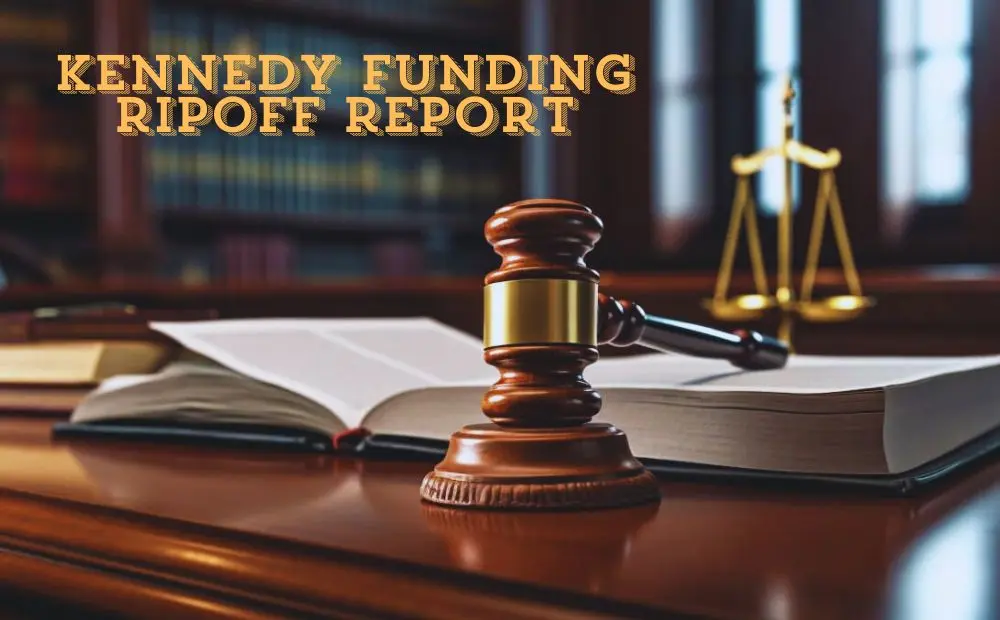
kennedy funding ripoff report, a well-known commercial real estate lender, has found itself under scrutiny through various ripoff reports. These reports have raised questions about the company’s practices, transparency, and overall reliability. This article delves into the details of the Kennedy Funding ripoff report, exploring the allegations, evidence, and implications for potential borrowers. We aim to provide a comprehensive and balanced view to help you make an informed decision.
Introduction to Kennedy Funding Ripoff Report
Kennedy Funding has been a prominent name in the commercial real estate lending industry for over three decades. Specializing in high-risk and unconventional loans, the company prides itself on its ability to provide quick, flexible financing solutions where traditional lenders may hesitate. Despite its long-standing presence and success stories, Kennedy Funding has faced criticism, leading to several ripoff reports questioning its integrity and business practices.
What is the Kennedy Funding Ripoff Report?

Ripoff reports are consumer complaints and allegations made against businesses, often published on dedicated websites like Ripoff Report. These reports aim to expose fraudulent or unethical practices, providing a platform for consumers to share their negative experiences. The Kennedy Funding ripoff report includes various claims from dissatisfied clients, ranging from hidden fees to unfulfilled promises.
Understanding the Allegations
Hidden fees
One of the most common allegations in the Kennedy Funding ripoff report involves hidden fees and unexpected charges. Some clients have claimed that the initial loan agreements did not clearly outline all the costs involved, leading to financial surprises later on. These hidden fees can significantly impact the overall cost of the loan, making it more expensive than initially anticipated.
Unfulfilled Promises
Several reports highlight instances where Kennedy Funding allegedly failed to deliver on their promises. This includes delays in loan approval, changes in terms after initial agreements, and even complete withdrawal of financing at critical stages of a project. Such actions can severely disrupt a borrower’s plans and lead to financial losses.
Aggressive Collection Practices
Another concern raised in the Kennedy Funding ripoff report is the company’s aggressive collection practices. Borrowers have reported feeling harassed and pressured by the company when they encountered difficulties in repaying their loans. This can add stress and further financial strain on already struggling businesses.
Investigating the Evidence
While the ripoff reports provide valuable insights into the experiences of some borrowers, it’s crucial to examine the evidence supporting these claims. Many reports are anecdotal and may not present the full context of the situations described. Therefore, it’s essential to consider multiple sources and seek verified information.
Court Cases and Legal Actions
A review of court cases and legal actions involving Kennedy Funding can provide a more objective view of the company’s practices. Legal records can reveal patterns of behavior and validate some of the claims made in the ripoff reports. However, it’s important to note that not all allegations result in legal action, and court decisions can vary based on specific circumstances.
Customer Reviews and Testimonials
In addition to ripoff reports, customer reviews and testimonials on various platforms can offer a broader perspective on Kennedy Funding’s reputation. Positive reviews may highlight successful transactions and satisfied clients, balancing the negative experiences reported. Analyzing both positive and negative feedback can help paint a more complete picture of the company’s performance.
Kennedy Funding’s Response
In response to the ripoff reports and allegations, Kennedy Funding has issued statements defending its practices and addressing the concerns raised. The company emphasizes its commitment to transparency and ethical conduct, stating that it strives to provide clear and fair terms to all clients. Kennedy Funding also encourages dissatisfied clients to contact them directly to resolve any issues.
Evaluating the Implications for Borrowers
Risk vs. Reward
Borrowing from a company like Kennedy Funding can be a double-edged sword. On one hand, their willingness to finance high-risk projects can be a lifeline for businesses unable to secure traditional loans. On the other hand, the potential for hidden fees and unfulfilled promises poses significant risks. Borrowers must carefully weigh these factors and conduct thorough due diligence before agreeing.
Due Diligence and Research
To mitigate risks, prospective borrowers should invest time in researching and understanding Kennedy Funding’s terms and conditions. Reading the fine print, asking detailed questions, and consulting with financial advisors can help uncover any potential pitfalls. Additionally, seeking out reviews and testimonials from multiple sources can provide a more balanced view of the company’s track record.
Alternative Financing Options
For those wary of the risks associated with Kennedy Funding, exploring alternative financing options may be a prudent choice. There are numerous lenders and financial institutions that offer commercial real estate loans with varying terms and conditions. Comparing these alternatives can help borrowers find a solution that best fits their needs and risk tolerance.
Traditional Banks
Traditional banks, despite their stringent lending criteria, remain a viable option for commercial real estate financing. They often offer lower interest rates and more transparent terms, albeit with a more rigorous approval process. For businesses with strong credit histories and stable financials, traditional banks can be a reliable source of funding.
Credit Unions
Credit unions are member-owned financial cooperatives that can provide competitive loan products. They typically offer personalized service and may be more willing to work with borrowers on flexible terms. Joining a credit union and leveraging its resources can be an advantageous alternative to commercial lenders.
Online Lenders
The rise of online lending platforms has introduced new possibilities for commercial real estate financing. These lenders often offer faster approval processes and more flexible terms compared to traditional institutions. However, borrowers should be cautious and thoroughly vet online lenders to avoid potential scams or unfavorable terms.
Protecting Yourself as a Borrower

Read the Fine Print
One of the most crucial steps in protecting yourself as a borrower is to read and understand all the terms and conditions of the loan agreement. Pay close attention to the interest rates, fees, repayment schedules, and any clauses that may allow the lender to change the terms. If anything is unclear, seek clarification before signing.
Consult Financial Advisors
Financial advisors can provide valuable insights and guidance when navigating commercial real estate loans. Their expertise can help you understand the financial implications of different loan options and make informed decisions. Consulting with an advisor can also help identify potential red flags in loan agreements.
Check References and Reviews
Before committing to a lender, check their references and read reviews from other borrowers. This can help you gauge the lender’s reputation and reliability. Look for patterns in the feedback—consistent complaints about hidden fees or poor communication should be considered red flags.
Kennedy Funding Ripoff Report: A Balanced Perspective
While the Kennedy Funding ripoff report raises legitimate concerns, it’s essential to approach the information with a critical and balanced perspective. Not all borrowers have negative experiences, and the company’s willingness to fund high-risk projects can be a valuable resource for certain businesses. By conducting thorough research and due diligence, borrowers can make informed decisions that minimize risks and maximize benefits.
Final Words
In conclusion, the Kennedy Funding ripoff report highlights important concerns that potential borrowers should be aware of. By conducting thorough research, reading the fine print, and exploring alternative financing options, borrowers can protect themselves and make informed decisions. While Kennedy Funding offers valuable services for high-risk projects, it’s crucial to approach any loan agreement with caution and due diligence. For more information please get in touch.
FAQs
What is Kennedy Funding known for?
Kennedy Funding is known for providing commercial real estate loans, particularly for high-risk and unconventional projects that traditional lenders may avoid.
Are the allegations in the ripoff reports verified?
The allegations in ripoff reports are based on individual experiences and may not be fully verified. It’s important to consider multiple sources and verified information when evaluating these claims.
What should I do if I have a complaint against Kennedy Funding?
If you have a complaint against Kennedy Funding, it’s recommended to contact the company directly to resolve the issue. You can also seek legal advice if necessary.
Are there alternative lenders to Kennedy Funding?
Yes, there are several alternative lenders, including traditional banks, credit unions, and online lending platforms. Each has its own terms and conditions, so it’s important to compare options.
How can I protect myself from hidden fees in a loan agreement?
To protect yourself from hidden fees, read the loan agreement thoroughly, ask detailed questions, and seek clarification on any unclear terms. Consulting with a financial advisor can also help identify potential pitfalls.
Is borrowing from Kennedy Funding worth the risk?
Borrowing from Kennedy Funding can be worth the risk for businesses that need quick and flexible financing for high-risk projects. However, it’s important to conduct thorough research and due diligence to understand the potential risks and benefits.
